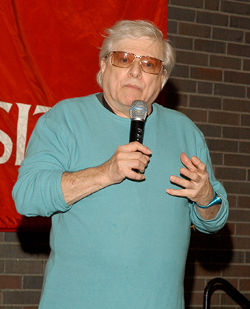He calls himself a futurist—some say he’s a comedian
Author Harlan Ellison makes his points with attitude and humor

This story was published on BU Today on October 13.
“Have I offended anyone here yet?” asked Harlan Ellison 10 minutes into his speech at Metcalf Hall on Tuesday night, October 11. For just over an hour, the notoriously foul-mouthed, cranky, and contentious 71-year-old author and self-styled cultural critic riffed, joked, and told colorful tales, all the while dangling his acerbic wit precariously close to the edge of perceived social acceptability.
“The whole concept of political correctness is over my head,” Ellison told an assembly of students, faculty, the general public, and members of the Howard Gotleib Archival Research Center Friends of the Libraries of Boston University, which had welcomed Ellison for the second installment of its current Friends Speaker Series season.
But there was less controversy than laughter, and Ellison resembled a stand-up comedian more often than not during the evening. He regaled the crowd with humorous anecdotes about playing robots with his pal Robin Williams, offered free advice (“If you can achieve in adult terms what you loved as a kid, then you’re a success”), and even got around to discussing his work.
“I write about people,” Ellison told the crowd. “I love to take ordinary people, with no superpowers, and just put them in a weird situation.” He cited the likes of “Shatterday,” an award-winning teleplay he wrote for the 1980s revival of Twilight Zone, a television series for which he was a creative consultant (and which was recently released on DVD).
In a series of essays criticizing TV’s negative impact on American culture, Ellison once referred to television as “The Glass Teat,” despite having written for such shows as Star Trek and The Outer Limits. He admitted to a weakness for Judge Judy, which fascinates him as viewer, and said he regards Lost as the best show on TV in years.
Full of contradictions, Ellison is an atheistic Jew and a humble elitist. He bristles at being labeled a science fiction writer and makes every attempt (see his seminal Dangerous Visions anthology) to distance himself from sci-fi convention, yet is a regular fixture at sci-fi conventions.
But then, there is little that is conventional about Ellison or his work, and he is both loved and hated for it. He makes no apology for his frank perspective, although he sometimes offers up a grain of salt to put in the wound. “I’m a professional liar,” he noted at one point. “I tell fantasy stories.”
A few in attendance previously acquainted with Ellison’s famously ribald, cantankerous, and larger-than-life personality speculated afterward that he may have toned down his shtick somewhat for the crowd, but as he himself noted at the beginning of the evening, “I never give the same speech twice.” One audience member thanked the Friends of the Libraries for inviting such a challenging and thought-provoking speaker.
With enviable multitasking panache, Ellison took plenty of time both before and after his talk to sign autographs and chat with fans. “I’m always in the middle of six different projects,” he replied when asked what was coming next. He’s working on a screenplay and a film adaptation of his comic book Harlan Ellison’s Dream Corridor, but it’s hard to know exactly what to expect next from a man who likes to keep people on their toes.